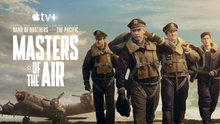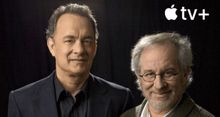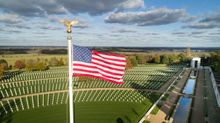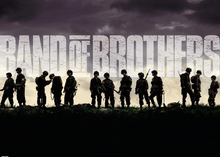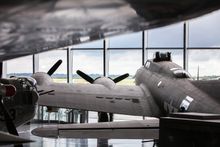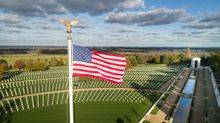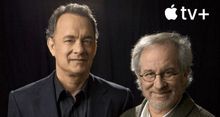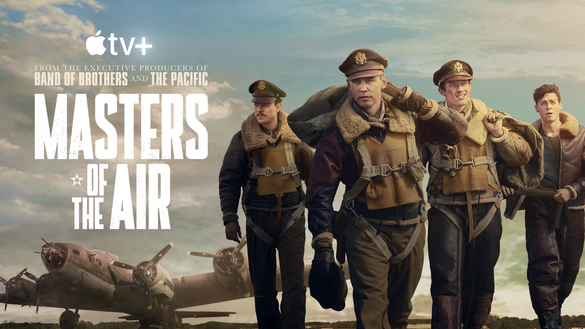 25 Jan 2024
25 Jan 2024
Tags: Masters of the Air, Visit East of England, East of England, Travel Trade, Inbound Tourism, Screen Tourism

On Friday January 26 Apple TV+ will stream the first two episodes of their $275m Masters of the Air mini-series, from Tom Hanks’ Playtone and Steven Spielberg’s Amblin Entertainment. One of its producers has said it’s the most expensive TV series ever made. Yes, really. And at its heart is the East of England.The World War II story, based on Donald L Miller’s eponymous book, is about the US Eighth Air Force who were predominantly based at airfields in Suffolk and Norfolk, and features real life characters from the 100th Bomb Group based at Thorpe Abbotts near Diss whose flying skill and bravery made them legendary figures.
The 9-episode mini-series, the last in Hanks’ and Spielberg’s wartime trilogy after Band of Brothers and The Pacific, features an array of young Hollywood talent, including Austin Butler and Callum Turner.
To coincide with the launch of Masters of the Air, Visit East of England & Partners, working in collaboration with VisitBritain, will launch our first promotional campaign in North America, aimed at bringing more US visitors to this region. It will direct people to a landing page on the VEE website.
The digital campaign is designed to use the Apple TV+ production as a gateway to expose potential visitors to our wider tourism offering, particularly themes that chime with the US market – our history and heritage, castles and cathedrals, stately homes, traditional pubs, tea rooms, higgledy-piggledy villages, and a warm welcome.
Those 350,000 American servicemen and women who transitioned through the East of England between 1942-45 would still recognise this region.
The timing is prescient. VisitBritain has reported that the United States is leading the UK’s tourism recovery. It is our largest and most valuable visitor market, and it is the one that is returning fastest after Covid.
US visitors spent a record £6bn across the UK last year on trips, up 42% on 2019. This means £1 in every £5 spent by overseas travellers is by Americans. VisitBritain are forecasting US visitors – who come throughout the year, not just in the Summer - will spend a record £6.9bn in 2024.
But those US visitors are not coming to the East of England beyond maybe a day trip to Cambridge. And that’s why Masters of the Air could mean so much for this region.
The opportunity is tantalising. When Band of Brothers aired in 2001, Normandy Tourism reported a 40% uplift in US visitors – and the D-Day beaches were already a rite of passage for Americans.
At that point, the museums in France were volunteer-run operations based largely on finds from farmers. Today, 20-plus years later, it is an eco-system of professionally-run museums and memorials which draw visitors from around the world.
On a trip to the Normandy coast last September, I saw there were wall-to-wall American visitors, spending money in hotels and restaurants that were invariably festooned with Stars and Stripes.
That’s the value of Screen Tourism. And we should put ourselves in a position to take advantage.
But the opportunity is not without its challenges. The D-Day battlefields in Normandy are set on a 30-mile-wide coastal strip that you can see, with all the visitor sites close by, open and run like businesses. The Masters of the Air battlefield was in the air and across Europe. Eighth Air Force visitor sites in the East of England are spread wide, are piecemeal, and are of varying quality. Most are not open and run like businesses. There is no central hub to tell the story, unlike the Overlord Museum in Normandy.
On D-Day everyone was a combatant with a tale to tell. The majority of those involved in the Masters of the Air narrative in the East of England were not combatants. Their story is not of glory and sacrifice, but of ensuring the war machine was kept functioning (for every ten crew there were 30 on the ground). Their story – The Friendly Invasion - is living in the East of England with the locals for three years. It is social history as much as military.
What we have that Normandy doesn’t is historical ties as well as a common language. People from this region helped make the USA, whether that’s the Bury St Edmunds lawyer who named Cape Cod and Martha’s Vineyard, the North Norfolk tobacco farmer who created The Special Relationship by marrying a native Indian and without whom Americans would now be speaking French, Dutch or Spanish, or the Thetford man whose writings saved the American Revolution from failure.
We can play to the interests of North Americans, reveal these historical connections that Normandy doesn’t have, and encourage them to engage with the Masters of the Air and Friendly Invasion stories while enjoying, for them, a new part of the British Isles and our wider tourism offering.
This is an opportunity through Screen Tourism to not just raise awareness of our region, and attract more inbound visitors, but also a chance to build better product for visitors. This could be the starting point for us to develop our own Masters of the Air tourism eco-system that would benefit the entire visitor economy, year-round.

